

24 Best “Classroom Rules” That Will Improve Student Behaviour. When it comes to classroom management, setting up some ground rules is a necessity.
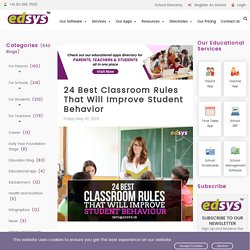
This will not only help teachers and students to go forward in a well organized and systematic way but also reflects in good classroom discipline. This is, in fact, a set of precepts that play a vital role in setting a structure for school classroom functions and organize learning activities. However, teachers should oversee that they maintain consistency while setting and implementing classroom rules just to avoid confusion among students. Moreover, teachers are supposed to lead from the front by setting an example. Here we are listing a few among the best classroom rules that can be implemented to improve student behavior and classroom discipline. 1.
Always come to class with complete preparation for learning. This includes taking all important materials needed for the day like textbooks, notebooks, pencils and pens, geometry boxes, lunch bags, and water. 2. 3. 4. Top 10 Classroom Rules for Elementary School Students. Classroom rules are important to your class community.
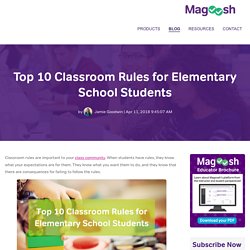
When students have rules, they know what your expectations are for them. Behavior Management versus Classroom Management. We sometimes make the mistake of interchanging the terms "behavior management" and "classroom management.
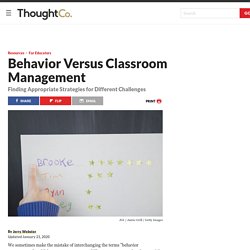
" The two terms are related, one might even say intertwined, but they are different. "Classroom management" means creating systems that support the kind of positive behavior across a classroom. "Behavior management" is made strategies and systems that will manage and eliminate difficult behaviors that prevent students from succeeding in an academic environment. A Continuum of Management Strategies and RTI Response To Intervention is built on universal assessment and universal instruction followed by more targeted interventions, Tier 2 which applies research-based strategies, and finally, Tier 3, which applies intensive interventions. In RTI are universal interventions. 8 Proactive Classroom Management Tips for New Teachers. In the 1950s, psychologists Jacob Kounin and Paul Gump discovered a curious side effect of discipline: If a student was being disruptive and the teacher responded with strict disciplinary measures, the student might stop—but other students would start exhibiting the same misbehavior.
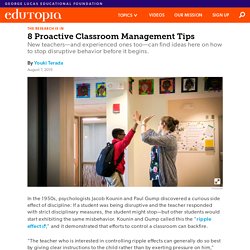
Kounin and Gump called this the “ripple effect,” and it demonstrated that efforts to control a classroom can backfire. “The teacher who is interested in controlling ripple effects can generally do so best by giving clear instructions to the child rather than by exerting pressure on him,” Kounin and Gump wrote. Decades later, classroom management is still a thorny issue for teachers. Nearly half of new teachers report that they feel “not at all prepared” or “only somewhat prepared” to handle disruptive students, in part because the average teacher training program devotes just eight hours to the topic, according to a 2014 report from the National Council on Teacher Quality. 1. Behavior and Classroom Management in Special Education. Behavior is one of the greatest challenges a special education teacher faces.
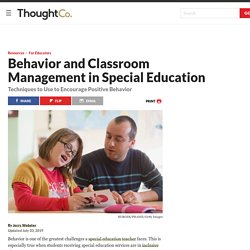
This is especially true when students receiving special education services are in inclusive classrooms. There are a number of strategies that teachers—both special and general education—can employ to help with these situations. We will begin by looking at ways to provide structure, move on to addressing behavior in general, and look at structured interventions as prescribed by federal law. The Key to Effective Classroom Management. It’s a daunting but all-too-common sight for many teachers: A classroom full of rowdy students who are unable to focus on the lesson. Classroom management techniques may get things back on track, but valuable time has already been lost.
Many experienced teachers know that making meaningful connections with students is one of the most effective ways to prevent disruptions in the first place, and a new study set out to assess this approach. In classrooms where teachers used a series of techniques centered around establishing, maintaining, and restoring relationships, academic engagement increased by 33 percent and disruptive behavior decreased by 75 percent—making the time students spent in the classroom more worthwhile and productive. “Strong teacher-student relationships have long been considered a foundational aspect of a positive school experience,” explains Clayton Cook, the lead author of the study and a professor at the University of Minnesota. Relationship reflection form. Classroom Management Styles: What's Your Style? Classroom Management Tips For Teaching Online. Positive Classroom Management Tips and Tricks. In gearing up for back to school, everyone is concerned about finding the best classroom management ideas.
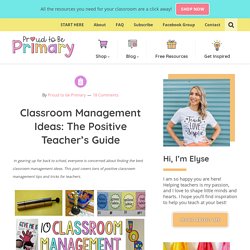
This post covers tons of positive classroom management tips and tricks for teachers. Let’s get our thoughts out into the open about classroom management ideas. Put your hand up if you’ve been like me and had these thoughts before school started… “What will I say when I want my students to listen?” “How will I get them to do what I want?” If you put your hand up for one or more of these thoughts, then you were like me and you realize that having good classroom management ideas is extremely important. Today, I will share some tried and true management strategies, tips and tricks that I have come to love. Using a Document Camera in Your Classroom. Screencastify - Screen Video Recorder.
(93) How to Make INTERACTIVE Google Slides (All the Basics & Then Some!) Get Moving. Free Printables. Learning Management System. Free Math Worksheets. Educators: Getting Started with Flipgrid. Roles on Remind – Help Center. Remind has roles that reflect the school community: teacher, student, parent, administrator, and no role.
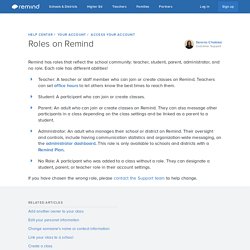
Each role has different abilities! Teacher: A teacher or staff member who can join or create classes on Remind. Teachers can set office hours to let others know the best times to reach them. Student: A participant who can join or create classes.Parent: An adult who can join or create classes on Remind. They can also message other participants in a class depending on the class settings and be linked as a parent to a student.Administrator: An adult who manages their school or district on Remind.
If you have chosen the wrong role, please contact the Support team to help change. StorylineOnline. Log in. ClassDojo. Tumblebooks - Apps on Google Play. Kids Login. BlueStreak Math on the App Store. Splash Math.